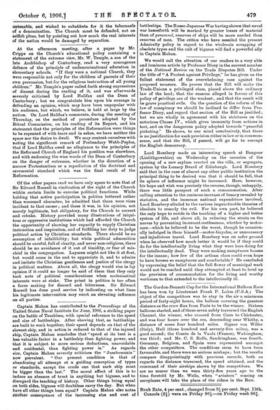At the afternoon meeting, after a paper by Mr. Cripps
on the Church's educational policy containing a statement of the extreme view, Mr. W. Temple, a son of the late Archbishop of Canterbury, read a very courageous defence of the principle of undenominational education in elementary schools. "If they were a national Church, they were responsible not only for the children of parents of their own persuasion, but for the religious instruction of all young children." Mr. Temple's paper called forth strong expressions of dissent during the reading of it, and was afterwards severely criticised by Lord Halifax and the Dean of Canterbury; but we congratulate him upon his courage in defending an opinion, which may have been unpopular with his audience, but which, we believe, is held at large by the nation. On Lord Halifax's comments, during the meeting of Thursday, on the method of procedure adopted by the Ritual Commission, on his reading of its Report, and his statement that the principles of the Reformation were things to be repented of with tears and in ashes, we have neither the apace nor the desire to dwell. We may content ourselves with noting the significant remark of Prebendary Webb-Peploe, that if Lord Halifax owed no allegiance to the principles of the Reformed Church of England his position was elsewhere, and with endorsing the wise words of the Dean of Canterbury on the danger of extremes, whether in the direction of a narrow Protestantism or a repudiation of the doctrinal and ceremonial standard which was the final result of the 'Reformation.






























































 Previous page
Previous page